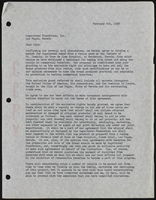Search the Special Collections and Archives Portal
Search Results
Ruth Moore Weaver oral history interview
Identifier
Abstract
Oral history interview with Ruth Moore Weaver conducted by her grandson, Danny Weaver, on November 22, 1986 for the Ralph Roske Oral History Project on Early Las Vegas. In this interview, Weaver begins by discussing her early life and family history. Weaver describes how Las Vegas, Nevada has developed and changed, as well her and her husband's participation in community organizations. She talks about her husband's jobs, how she prefers living in Southern Nevada compared to other areas, and segregation in the city. Weaver concludes by discussing why she prefers to live in Henderson, Nevada and the history of gambling in Nevada.
Archival Collection
Kenneth W. Swallow oral history interview
Identifier
Abstract
Oral history interview with Kenneth W. Swallow conducted by Cynthia Brannon on March 11, 1975 for the Ralph Roske Oral History Project on Early Las Vegas. In this interview, Swallow discusses his personal history and the history of Southern Nevada. Swallow describes moving to Boulder City, Nevada during the 1940s and his career working for the postal service. Swallow goes on to describe prominent figures who visited the Hoover (Boulder) Dam, his involvement in organizations, recreational activities, and nuclear testing. He concludes by discussing the history of Basic Magnesium Inc. and the city of Henderson, Nevada, and how Boulder City has developed and changed.
Archival Collection
Jane Reid Yeager oral history interview
Identifier
Abstract
Oral history interview with Jane Reid Yeager conducted by Lois J. Cooper on July 03, 1975 for the Ralph Roske Oral History Project on Early Las Vegas. Yeager begins by discussing owning a cafe in Henderson, Nevada and the Mexican and Asian populations in Southern Nevada. She describes visits by prominent politicians and life in Henderson, as well as changes she has observed in Nevada, including the construction of highways, increased tourism, and the development of casinos in Las Vegas, Nevada. Yeager goes on to talk about her husband's writings about Nevada and prominent mines in the state. She concludes by discussing flooding and cattle ranching in Southern Nevada.
Archival Collection
La Porta, Louis F., 1924-
Louis La Porta grew up in Tuckahoe, New York. He served in the United States Air Force. He moved to Henderson, Nevada during World War II. La Porta served on the city concil of Henderson, Nevada, and the Board of Clark County.
Person
Paul Norton oral history interview
Identifier
Abstract
Oral history interview with Paul Norton conducted by Sergio Pellegrino on April 3, 1981 for the Ralph Roske Oral History Project.
In this interview, Paul Norton discusses his life in Henderson, Nevada and Las Vegas, Nevada from 1952 onward. He shares details of his work at Basic Magnesium Inc. (BMI) and at mills around the Valley. Norton talks about his opposition of the MX missile, in contrast to his opinions about atomic testing in Nevada. He also discusses the businesses that operated from 1950 to 1980, how the Las Vegas Strip was constructed, details of Fremont Street and the I-15 freeway, and flooding that was particularly destructive in Henderson.
Archival Collection
Sherrill L. Ware oral history interview
Identifier
Abstract
Oral history interview with Sherrill L. Ware conducted by Lawrence R. Gross on March 18, 1978 for the Ralph Roske Oral History Project on Early Las Vegas. Ware begins by discussing his service in the United States Navy stationed at Lake Mead before working as a gun manufacturer in Henderson, Nevada. He describes his experience with firearms, including participating in shooting competitions and hunting. Ware talks about life in Las Vegas, Nevada, how the city changed over time, and his career as an operating engineer. Ware also talks about labor unions and the difficulties they face from the companies they worked within, as well as mining in Nevada.
Archival Collection
Nellie Bunch oral history interview
Identifier
Abstract
Oral history interview with Nellie Bunch conducted by Robin Ducharme on November 20, 1975 for the Ralph Roske Oral History Project on Early Las Vegas. Bunch first talks about her settlement into the Whitney Ranch area of Henderson, Nevada, and her knowledge about the building of Hoover (Boulder) Dam. She also talks about the early utilization of water resources from Lake Mead, early sources of power, and the early use of evaporative coolers. Bunch also speaks about her experience as a postmaster and later discusses telephone technology and the early churches of Las Vegas, Nevada. Digital audio and transcript available.
Archival Collection
Woodrow Wilson oral history interview
Identifier
Abstract
Oral history interview with Woodrow Wilson conducted by Perry Kaufman on November 01, 1977 for the Ralph Roske Oral History Project on Early Las Vegas. Wilson discusses work at the McNary sawmill in Arizona, and later arriving in Las Vegas, Nevada to work at the Basic Magnesium Plant, located in Henderson, Nevada. Wilson also talks about discrimination between maids in motels and hotels, along with moments of segregation at the Basic Magnesium Plant. He then explains how he organized and became a board member of The National Association for the Advancement of Colored People (NAACP) in Las Vegas.
Archival Collection


